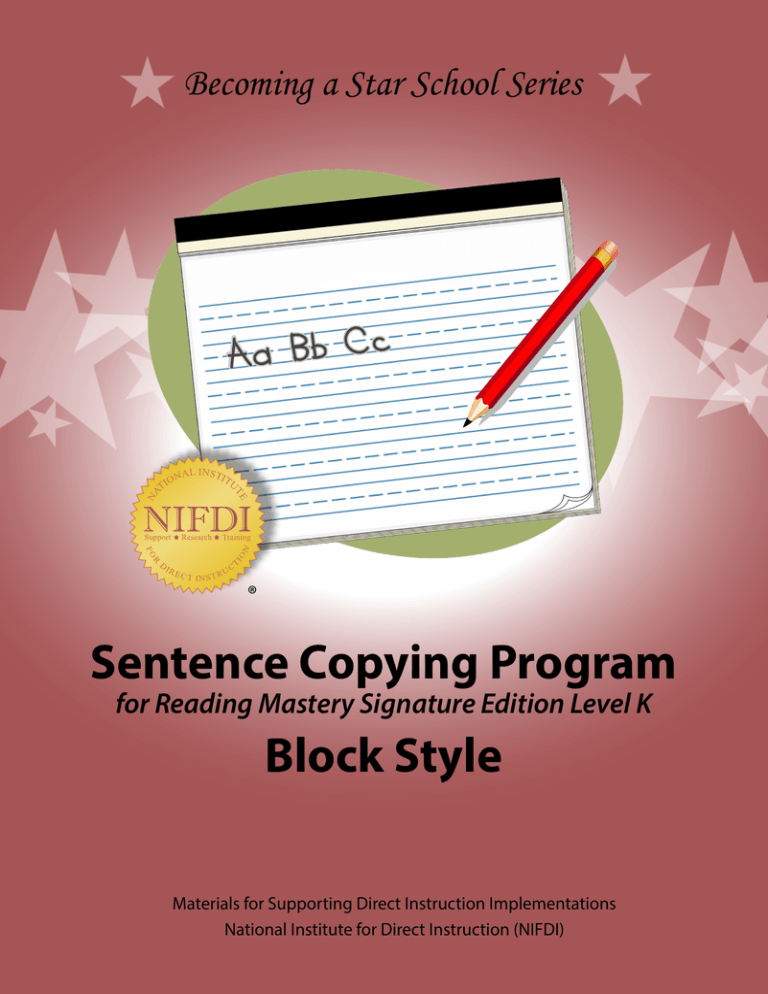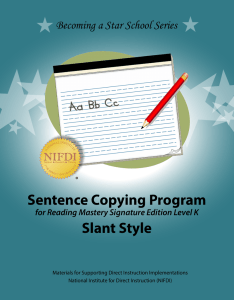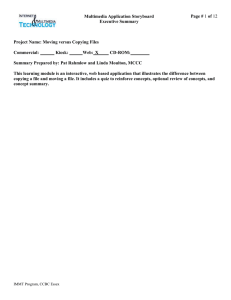
Becoming a Star School Series
®
Sentence Copying Program
for Reading Mastery Signature Edition Level K
Block Style
Materials for Supporting Direct Instruction Implementations
National Institute for Direct Instruction (NIFDI)
SENTENCE COPYING
READING MASTERY
Signature Edition Level K
block style
Sentence Copying Program for Reading Mastery Signature Edition Level K: Block Style
Copyright © 2014 by NIFDI Press
A division of the National Institute for Direct Instruction
805 Lincoln Street
Eugene, Oregon 97401-2810
USA
All rights reserved. No part of the work covered by this copyright hereon may be
reproduced or used in any form or by any means – graphic, electronic, or mechanical,
including photocopying, recording, taping, or information storage and retrieval systems
– without the written permission of the publisher.
Printed in the United States of America
12 3 4 5 6
ISBN-10: 193985105X, ISBN-13: 978-1-939851-05-5
NIFDI Sentence Copying Program
for Reading Mastery Signature Edition
Level K
The NIFDI Sentence Copying program, developed at the National Institute for
Direct Instruction, is a supplemental handwriting program to accompany SRA’s
Reading Mastery Signature Edition Level K (RMSE K). The sentence copying sheets
correlate with RMSE K’s sequence of skill development but do not employ its
orthography. Instead, they provide handwriting practice of letter forms more
commonly taught in typical elementary classrooms.
Students in RMSE K must reach at least lesson #60 before starting the NIFDI
Sentence Copying Program. Sentence copying sheets may be presented after
reading lessons of equal or higher numbers. (Example: sentence copying sheet #74
may be presented after reading lesson #74, 85, or 91, but not after lesson #72.)
Lesson
Number
60-82
Procedure
Sentence copying sheets are ideally presented as part of independent
seatwork activities and are designed to be completed by students without
guidance.
When introducing the sheets to students, direct them to trace the sentence
and then copy it onto the lines provided. After a few days, no such
introduction should be necessary, but it is important to continue to
reinforce students for neatness, completion, and other good work habits.
An alternative plan (for students who have the necessary preskills) is to
simply post the sentence on the chalkboard for students to copy onto
paper a designated number of times.
(continued next page)
August 2014
NIFDI RMSE K Sentence Copying Program – block style
© National Institute for Direct Instruction
Lesson
Number
83-160
Procedure
Present sentence copying sheets as a timed group
activity.
1. Distribute the sheets and have students write their
names at the top.
2. Read the sentence.
3. Say, “You’re going to copy the sentence as
many times as you can in three minutes.
Remember to start with a capital letter and end
with a period [or question mark]. Get ready. Go.”
4. At the end of three minutes, say, “Stop. Count the
number of words you wrote. Write that number
at the end of where you stopped writing.”
Rate criteria
L. #81-100:
10 or more words
L. # 101-120:
12 or more words
L. #121-140:
14 or more words
L. #141-160:
16 more words
5. Tell the students, Raise your hand if you wrote __
or more words. That’s a super job.” (See rate
criteria in next column.)
August 2014
NIFDI RMSE K Sentence Copying Program – block style
© National Institute for Direct Instruction
Name______________________________________________________
I am mad.
I am mad.
August 2014
NIFDI RMSE K Sentence Copying Program – block style
© National Institute for Direct Instruction
Permission is granted to reproduce for classroom use.
L. #60
Name_____________________________________________________
Is she a rat?
August 2014
NIFDI RMSE K Sentence Copying Program – block style
© National Institute for Direct Instruction
Permission is granted to reproduce for classroom use.
L. #120
Name_____________________________________________________
L. #160
We can pet a deer.
August 2014
NIFDI RMSE K Sentence Copying Program – block style
© National Institute for Direct Instruction
Permission is granted to reproduce for classroom use.


